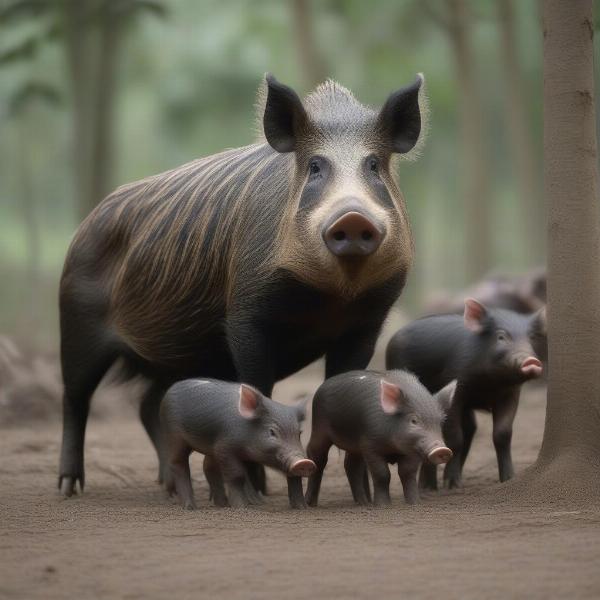Dogs and boars might seem like an unlikely pairing, but encounters between these two animals are more common than you think, especially in rural areas or regions where wild boars roam. Understanding how dogs react to boars, and how to manage these situations, is crucial for ensuring the safety of both animals. Whether your dog is a curious puppy or a seasoned hunting breed, knowing how to handle a boar encounter can prevent serious injury and ensure a peaceful coexistence.
While some dogs, especially hunting breeds, might instinctively chase or confront a boar, this can be incredibly dangerous. Boars are powerful animals with sharp tusks capable of inflicting serious wounds. Even smaller dogs can provoke a defensive reaction, putting themselves at risk. A surprised or cornered boar will likely charge, and their tusks can cause deep lacerations and puncture wounds.
Understanding Boar Behavior
Boars are generally not aggressive animals unless they feel threatened or are protecting their young. They prefer to avoid confrontation and will usually flee if given the opportunity. However, if a dog approaches too closely, makes threatening gestures, or attempts to chase, the boar will likely defend itself.
 Boar in Defensive Posture with Piglets
Boar in Defensive Posture with Piglets
Understanding boar behavior can help you anticipate potential encounters and react appropriately. Signs of agitation in a boar include raised bristles, snorting, and pawing the ground. If you see a boar exhibiting these behaviors, it’s essential to leash your dog immediately and calmly back away.
Keeping Your Dog Safe During a Boar Encounter
The best way to ensure your dog’s safety is to prevent encounters altogether. When walking in areas known to have boar populations, keep your dog on a leash, preferably a short one, to maintain control. Avoid letting your dog roam freely, especially at dawn and dusk when boars are most active.
If you do encounter a boar, remain calm and avoid making sudden movements that could startle the animal. Speak to your dog in a reassuring tone and slowly back away from the boar. Do not attempt to intervene if your dog and the boar engage, as this could put you at risk. Instead, make loud noises to scare the boar away.
Training Your Dog for Boar Encounters
While preventing encounters is the primary goal, training your dog to respond appropriately can add an extra layer of safety. Recall training is crucial, ensuring your dog will return to you immediately when called, even under distraction. Teaching your dog a “leave it” command can also be beneficial in deterring them from approaching or chasing a boar.
What to Do if Your Dog is Injured by a Boar
If your dog is injured by a boar, seek veterinary attention immediately. Boar tusks can cause deep puncture wounds that are prone to infection. Even seemingly minor injuries should be examined by a vet to ensure proper treatment and prevent complications.
Conclusion
Encounters between dogs and boars can be dangerous, but with proper precautions and training, you can significantly reduce the risk. By understanding boar behavior and implementing appropriate safety measures, you can protect your dog and ensure peaceful coexistence between these two animals. Remember, prevention is key, and a proactive approach is always the best strategy.
FAQ
- Are boars aggressive towards dogs? Boars are not inherently aggressive but will defend themselves if they feel threatened.
- What should I do if I see a boar while walking my dog? Leash your dog immediately and calmly back away.
- How can I train my dog to avoid boars? Focus on recall training and the “leave it” command.
- What should I do if my dog is injured by a boar? Seek immediate veterinary attention.
- Are there specific times of day when boar encounters are more likely? Yes, dawn and dusk are when boars are most active.
About ILM Dog
ILM Dog is your trusted international resource for comprehensive dog care information and expert advice. We cover all aspects of dog ownership, from breed selection and health care to training, nutrition, grooming, and much more. We strive to empower dog owners worldwide with the knowledge and resources they need to provide the best possible care for their furry companions. For expert guidance and tailored advice, contact us at [email protected] or call us at +44 20-3965-8624.